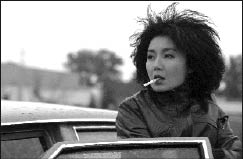Picking Up the Pieces
by Girish Shambu

Here’s a strange thing: France has a great tradition of film critics who turn into filmmakers, but that’s never been the case in America. In France in the 1950s, seduced by the Hollywood movies of Hitchcock and Hawks, a number of whippersnapper critics from the magazine Cahiers du Cinema, like Truffaut and Godard, gave birth to the French New Wave. That tradition in France has stayed alive to the present day.
A good example is former critic Olivier Assayas, who is best known for directing Irma Vep, a gritty and funny account of the making of a movie. (Reminiscent of Truffaut’s Day for Night, it’s available on DVD and is often cited as one of the best movies of the 1990s.)
Irma Vep is a love letter to movies and to its lead actress, Maggie Cheung, the international Hong Kong superstar. Assayas and Cheung were married soon after but were divorced a couple of years later. After their divorce—in an unusual turn—Assayas wrote Clean as a vehicle to showcase her versatile acting talents. Since many of Cheung’s roles have been in Hong Kong action films, her flexible and powerful performance in Clean came as a complete surprise. She won the best actress award for it at the Cannes film festival in 2004.
In the movie, she plays Emily, a rock-and-roll widow and recovering drug addict who loses her husband to a drug overdose. Their six-year-old boy, whom she has barely seen, lives with her in-laws. After emerging from a short stint in prison for possession, Emily tries to pull her life together step by step, trying to find her bearings in the real world, looking for work and stability and hoping to someday regain the trust of her little boy.
On the surface this setup has all the makings of a by-the-numbers TV drama of the week, but that’s not how it plays at all. Clean turns out to be an utterly gripping and moving film that quickly leaves the clichés of its genre far behind. The contours of the story might be vaguely familiar, but the details of the plot unfold in a steady stream of small surprises. For example, most drug-addict movies like to linger exploitatively on scenes of shooting up or sinking low into the gutter. In Clean, we pass over these graphic and melodramatic moments altogether and instead spend time in the everyday. Even an important event like the little boy finding out about the death of his father is passed over entirely. We expect the movie to dust off the custody battle subplot that is so familiar from its genre, but we never go there either.
Clean contains two powerhouse, indelible performances. Maggie Cheung’s Emily is remarkable because she goes from a cold and self-absorbed addict into a wounded, slightly tentative, but cautiously hopeful woman who wants to one day learn how to be a mother. Nick Nolte, who plays her father-in-law, delivers the single best performance I have ever seen by him. His character is a large and scruffy man, broken up by sorrow, but realizing that he can’t admit defeat because there are others around him who depend on him. We see cracks in his craggy face where the sorrow threatens to break him open and he struggles to stay intact. Nolte doesn’t show us his naked emotions—instead, he makes us intuit them by underplaying his performance.
I must mention the visual flair of this movie. It’s shot by Eric Gautier, one of the world’s leading cinematographers, and takes place in many cities—London, Paris, Vancouver—but opens on familiar ground, in Hamilton, Ontario. I’ve driven past this smoke-streaked factory landscape countless times on the QEW but I never expected it to look as breathtaking and visually poetic as it does here on celluloid.
|
Issue Navigation> Issue Index > v5n23: Greed and the Demolition of the H-O Oats Elevator (6/8/06) > Film Reviews > Picking Up the Pieces This Week's Issue • Artvoice Daily • Artvoice TV • Events Calendar • Classifieds |









 Current Issue
Current Issue